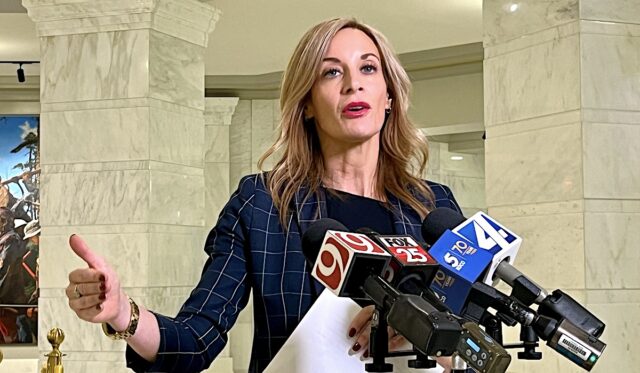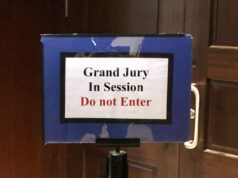
In a blistering review of how Oklahoma agencies spent pandemic-era federal funds, an audit released today by State Auditor and Inspector Cindy Byrd sharply criticized the Office of Management and Enterprise Services for failing to seek bids on a series of state contracts.
Byrd’s audit also alleged that Shelley Zumwalt, now a member of Gov. Kevin Stitt’s Cabinet, failed to disclose that her husband was a top official with a software company that received more than $8 million in federal funds to rebuild the Oklahoma Employment Security Commission’s antiquated computer systems that crashed weeks into the pandemic when thousands of people were filing for unemployment benefits.
Attorney General Gentner Drummond, who frequently chimes in on state issues making headlines and often butts heads with Stitt, called for Zumwalt to resign as executive director of the Oklahoma Tourism and Recreation Department and as secretary of tourism, wildlife and heritage. He asked that Zumwalt “cooperate fully with my office as I seek to determine whether any Oklahoma statutes were violated.”
At the end of a press conference late Tuesday where she called Byrd’s audit “misleading,” Zumwalt said “of course” she would cooperate with Drummond.
“I have great respect for the Central Purchasing [Act], and the contract we are talking about was done under a declared emergency,” Zumwalt said. “We all remember COVID-19, and I think it’s really important to view this situation under that lens as well.”
Zumwalt said a legislative effort she was pushing to exempt the Tourism and Recreation Department from components of the Central Purchasing Act has now been withdrawn following extensive questioning from the Senate Appropriations and Budget Committee last week.
‘Oklahoma is rapidly becoming a no-bid state’
Some of the problems highlighted by Byrd involved Oklahoma’s administration of federal CARES Act funds, which Stitt branded as CARES Forward. Congress passed the CARES Act in an effort to bolster public services during the pandemic.
Called a “federal single audit,” Byrd’s report released Tuesday (embedded below) constitutes the mandated annual review of whether the state of Oklahoma spent federal grant money in compliance with federal regulations. The latest report covers more than $13 billion, which are audited through a formula provided by the federal government. A majority of the money came from COVID-19 relief funds.
The report released Tuesday covers the state’s 2022 fiscal year, which ended June 30, 2022. This is the second year in a row that Byrd’s office has found questionable costs with how Oklahoma appropriated pandemic-era federal funds. She said last year that the state “dropped the ball on compliance and oversight.”
Oklahoma kept making errors during 2022 fiscal year, according to Byrd’s 226-page audit report.
Byrd, in a press release accompanying her audit, said the most compelling finding was that COVID-19 allowed OMES to establish a new set of rules for vendor contracts. The Oklahoma Central Purchasing Act requires OMES to conduct a competitive bidding process to vet most potential vendors, but OMES neglected to follow the statute, she said.
Zumwalt reminded media that, in 2020 when OESC’s initial contract with Phase 2 Development was signed before she became director, the public was seeking immediate response to issues created by the pandemic. Stitt, for instance, declared a catastrophic health emergency, which triggered his ability to suspend certain regulatory statutes for action by the state’s public health authority.
Byrd said problems identified in the audit point to OMES’ disregard for competitive bidding requirements and a systemic lack of oversight and accountability. The Code of Federal Regulations requires the state of Oklahoma to use the state’s competitive bidding policies and procedures before awarding vendor contracts, but instead the State Auditor and Inspector’s Office discovered OMES was operating under a 2019 pilot program it termed “rolling solicitations.”
Under the program, OMES directors, the chief information officer and the purchasing director gave themselves permission to place any vendor of their choice on a list to be awarded state contracts without a competitive bid, Byrd said.
“In my opinion, Oklahoma is rapidly becoming a no-bid state,” Byrd said. “This is a grave disservice to every Oklahoman. The ‘rolling solicitation’ design allows for circumvention of financial safeguards and could place potentially better state vendors at an unfair disadvantage.”
As a result, Byrd asked the Legislature to:
- Investigate the “rolling solicitation” process employed by OMES;
- Investigate the revenue stream associated with the “rolling solicitation” process and determine if it has created an incentive for noncompliance with sound competitive bidding procedures; and
- Review the growing list of exemptions to competitive bidding laws that do not protect taxpayer dollars.
“The state is 100 percent responsible for following federal guidelines and ensuring any recipients or subrecipients comply with the terms of federal grants,” Byrd said. “Oklahoma taxpayers could be forced to return millions of dollars to the federal government.”
Zumwalt accused of conflict of interest with software firm
Byrd’s report states that Stitt’s CARES Forward leaders earmarked $17 million of federal funds to help OESC make needed improvements to its computer network mainframe. Because of the pandemic, OESC had a large backlog of unemployment claims.
In April 2020, OMES contracted with Phase 2 Development, a software company, to recover, stabilize and update the agency’s systems. The contract was not competitively bid, nor had Phase 2 had a previous contract with the state of Oklahoma, according to Byrd.
Zumwalt, who previously served as chief innovation officer at OMES, was named interim executive director of OESC in May after a prior director resigned amid turmoil. Between April 2020 and August 2022, OMES, through contract and multiple change orders, paid Phase 2 about $7 million to stabilize and improve the OESC mainframe, Byrd said.
By April 2022, Zumwalt had approved additional contracts and change orders to Phase 2 totaling about $8.5 million, Byrd said.
In her press conference Tuesday, Zumwalt emphasized that the initial Phase 2 contract was approved the month before she was hired as interim director of OESC.
However, in subsequent documents and contract extensions, Byrd said Zumwalt failed to disclose that her husband, John Zumwalt, was the vice president of Phase 2. As director of OESC, Zumwalt was required to complete annual forms stating that no related party transactions existed regarding the expenditure of funds. She checked “No” on the forms, Byrd said.
“Federal law requires that any entity receiving federal grant money must disclose any conflict of interest in writing,” Byrd said. “Any person who could possibly benefit from a federal grant cannot be part of the selection, award or contracting of that money.”
Asked whether she believed her husband’s employment at Phase 2 Development constituted a “related-party transaction,” Zumwalt said she had been told several times by OMES and attorneys that no conflict of interest existed.
“I would go back to my statement that I have not talked to Auditor Byrd or anyone on her staff, so I would truly like to understand what she’s talking about,” Zumwalt said. “At the point where there was a disclosure, I have disclosed many, many times to all parties that my husband is an employee of this company. We are not part of the ownership group, we have never been part of the ownership group, and he is not working on state contracts.”
Legislation went into effect in late 2022 that required appointees to heads of agencies to disclose any conflicts of interest to the Oklahoma Ethics Commission. Zumwalt discussed her husband’s employment at Phase 2 after she was named executive director of the Tourism and Recreation Department in 2022, Byrd said.
Prior to her press conference, Zumwalt said in an emailed statement that the contracts with Phase 2 were executed and approved by OMES and the state’s chief information officer, Jerry Moore. The initial contracts and all agreements to begin work with Phase 2 were executed before she was appointed by the OESC Board of Commissioners on May 27, 2020, and she did not have any decision-making authority when OMES hired Phase 2 to work with OESC, Zumwalt said.
She said that before she was being considered to head OESC, legal counsel at OMES was consulted out of an abundance of caution. She said it was determined the arrangement did not constitute a conflict of interest. Upon being named the executive director at OESC, Zumwalt said she had a direct conversation with legal counsel at OESC and OMES to ensure all were aware of her husband’s employment. She again said she was assured there was no conflict.
However, at her press conference, Zumwalt said she was unaware whether any documentation to that effect exists.
“I’d have to go back and look,” she said.
In his own press release, Drummond called Zumwalt’s actions “one of the most egregious findings” in the audit.
“This level of self-dealing represents an unforgivable breach of trust that disqualifies Ms. Zumwalt from overseeing the expenditure of our tax dollars,” Drummond said. “She should resign immediately.”
Zumwalt, who has worked in state government for 12 years, said she is not resigning.
“The auditor’s report is misleading,” she said in her statement. “I’ve never had a conversation with Auditor Byrd or her team regarding this matter. A thorough review of this situation would have easily cleared up any confusion on the many sign-offs and disclosures that happened well before I was named executive director of OESC.”
Consulting contract with CARES Forward questioned
In an unrelated pandemic-era federal funding examination, Byrd said in Tuesday’s audit announcement that neither Jill Geiger, who was hired to oversee the CARES Forward program, nor her firm appeared to have the necessary experience for administering federal grants.
“Federal grant guidelines are incredibly complex and require a high level of expertise to manage properly,” Byrd said.
Jill Geiger Consulting, which was formed Jan. 30, 2020, was given the position of team lead and project director over the CARES Forward program. Until 2019, Geiger had worked 15 years in the OMES budget department.
In May 2020, OMES awarded Geiger’s company a no-bid contract to administer, monitor and provide reporting on the CARES Forward money. Byrd said bids should have been sought for the $325,000 contract. A former co-worker of Geiger’s was assigned to provide oversight and monitoring of Geiger’s work.
Byrd said OMES paid Jill Geiger Consulting before verifying any work had been performed. In some instances, she said her office was unable to determine whether the work had occurred.
Altogether, OMES paid Jill Geiger Consulting $1.1 million for the administration of CARES Forward and the Governor’s Emergency Education Relief funds from 2020 to 2022. The state auditor’s office is questioning all of the $718,416 that OMES paid Jill Geiger Consulting in the 2022 fiscal year, Byrd said.
In an emailed response, Geiger said the pandemic was a critical and hectic time and that “undoubtedly mistakes were made during the first six months of the pandemic.”
“Our company was tasked with supporting the rapid issuance of $1.2 billion in federal disaster relief to those agencies and organizations on the front lines struggling to make payroll and keep people in their homes, not to mention those agencies who were battling against the disease that was killing thousands of Oklahomans,” Geiger said. “As the SAI report mentions, these were mostly mistakes of proper documentation or procedural steps that we believed were waived as part of the catastrophic health declaration we were under.”
Geiger said those mistakes represented “a small percentage of overall dollars” that were reimbursed to agencies and organizations.
“Even though the report contains factual errors, the SAI audits find fault with less than 2 percent of the total dollars deployed by the procedures we executed,” Geiger said. “In other words, our company performed the duties for which we were hired and got better than 98 percent of the reimbursement efforts correct in the middle of a global health pandemic.”
In regard to the lack of competitive bidding on her company’s contract, Geiger said Byrd’s report failed to recognize that statute allowed the governor to waive sections of law to enable expedient response during a declared catastrophic health emergency, which Oklahoma was under in May 2020 when the contract was signed.
Geiger also disputed Byrd’s findings that her firm was paid for work not performed.
“In making this incorrect assessment, the report improperly combines disparate contracts citing timing from one contract while using a scope from a different contract, alluding to them being the same contract,” Geiger said. “There is significant evidence of work performed for all contracts JGC has with the state of Oklahoma.”
Emergency Rental Assistance Program

The largest amount of questioned costs in the audit released Tuesday dealt with how the state appropriated $276 million distributed to it through the Emergency Rental Assistance Program, which was earmarked to help Oklahomans with rental and utility assistance.
OMES contracted with Communities Foundation of Oklahoma, a nonprofit entity, to receive $241 million and implement the program by funding partner agencies around the state to process and pay qualifying participant claims. The money was spent over two fiscal years, according to the state audit. Byrd’s federal single audit released last year also alleged misuse of ERAP dollars by the Communities Foundation of Oklahoma.
Byrd’s report questioned:
- CFO’s administrative and management fees: OMES advanced lump-sum payments to CFO for its administrative costs to oversee the ERAP grant without monitoring or requiring documentation for how much CFO actually spent for program and administrative costs. “Federal funds provided for administrative costs are not for the nonprofit to make a profit,” Byrd said;
- Conflict of interest allegations: Jill Geiger Consulting prepared federal reports on behalf of the state for ERAP expenditures. Because of vague wording in contracts and/or a lack of proper contracting procedures, Byrd said it is unclear how OMES paid Jill Geiger Consulting for the services; and
- Afghan refugee relocation efforts: CFO directed $6.5 million to relocate refugees from Afghanistan into Oklahoma. This was not an allowable expense for this grant. Other grants were available to the state, Byrd said.
Of the $206 million granted to CFO during the 2022 fiscal year for the administration of ERAP funding, the State Auditor and Inspector’s Office is questioning about $21 million, Byrd said. She estimated more than 5,338 Oklahomans did not get financial help they could have during the pandemic.
Read the full 2022 federal single audit
